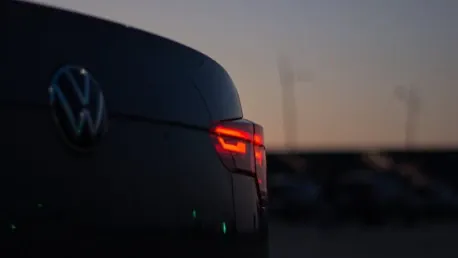Volkswagen, a German automaker, has officially stepped away from investing in hydrogen vehicles, a move driven by skepticism about hydrogen’s viability compared to battery technology. Once considered a futuristic option, the company no longer perceives hydrogen as beneficial. CEO Thomas Schaefer indicated that while hydrogen fuel cells once appeared promising due to potential advantages like powering heavy-duty vehicles and long-distance travel, they have significant drawbacks. Volkswagen initially embraced hydrogen, even filing patents for technology that promised extensive ranges. This commitment was part of a broader strategy to offer diverse, sustainable fuel options alongside electric vehicles (EVs). However, the company faced certain issues with hydrogen, including the inefficiency of energy conversion compared to batteries and the high costs associated with building infrastructure and producing fuel cells.
Progress in hydrogen technology lagged behind the rapid advancements in the EV sector. Companies like Tesla set high benchmarks for battery-electric vehicles (BEVs), making hydrogen less competitive. Financial and logistical challenges emerged as unsolvable obstacles, pushing Volkswagen to refocus its efforts on EV technology. This decision nudges VW closer to its goal of leading the growing EV market, where charging stations are more readily available and cost-effective. While Volkswagen shifts its strategy, companies like Toyota and BMW continue to invest in hydrogen technology. However, Volkswagen remains dedicated to its BEV strategy, highlighted by the launch of the ID.7, the sixth model in its ID family of electric vehicles. By focusing on electric vehicles, VW aims to cater to its customer base transitioning from traditional to electric cars.
The Hydrogen Dream and Its Challenges
Volkswagen’s initial excitement for hydrogen was anchored in the potential benefits it presented. Hydrogen fuel cells were touted as an ideal solution for heavy-duty vehicles and long-distance travel due to their ability to deliver impressive range and short refueling times. The company’s early investments included patent filings and exploratory projects intended to integrate hydrogen technology into their diverse range of sustainable fuel options. This vision, however, did not account for the imminent technological and financial challenges that would accompany the development of a hydrogen ecosystem.
One of the most significant hurdles Volkswagen faced was the inefficiency of converting hydrogen into usable energy compared to the more straightforward process in battery-electric vehicles. Hydrogen fuel cells require a multi-step process, including electrolysis to separate hydrogen from water and then transforming it back into electricity within the fuel cell. This two-step conversion results in significant energy loss, making hydrogen less efficient than battery technology. Additionally, the high costs associated with developing a comprehensive hydrogen infrastructure, including production, storage, and distribution facilities, further complicated the economic viability of hydrogen vehicles for Volkswagen.
EV Technology: The Path Forward
In contrast to the slow and expensive development of hydrogen infrastructure, the rapid advancements in EV technology have positioned battery-electric vehicles as the more viable alternative. The growing availability of charging stations, coupled with significant advancements in battery efficiency and production, has created a competitive edge for EVs over hydrogen fuel cells. Furthermore, major players in the EV market, such as Tesla, have set high benchmarks for performance and range, compelling other automakers, including Volkswagen, to prioritize EV technology in their strategic plans.
Volkswagen’s commitment to the EV market is underscored by the launch of its ID family of electric vehicles, particularly the latest ID.7. This shift not only aligns with the company’s sustainability goals but also positions Volkswagen to lead in a market where consumer interest in electric vehicles is steadily rising. By focusing on battery-electric vehicles, Volkswagen aims to cater to the evolving preferences of its customer base, which is increasingly moving away from traditional internal combustion engines to more eco-friendly alternatives. This strategy also leverages the existing and expanding EV infrastructure, making electric vehicles a more practical and cost-effective option for consumers and the company alike.
Conclusion: Was It the Right Choice?
Volkswagen, the German automaker, has officially decided to discontinue its investment in hydrogen vehicles, due to skepticism about hydrogen’s practicality compared to battery technology. Although hydrogen fuel cells once seemed futuristic, Volkswagen CEO Thomas Schaefer noted they now see fewer benefits. Despite initial promises, hydrogen has significant downsides, such as inefficient energy conversion and high costs for infrastructure and fuel cell production. Volkswagen initially supported hydrogen, even filing patents for long-range technology, as part of a strategy to offer diverse, sustainable fuel options alongside electric vehicles (EVs).
However, advancements in hydrogen lagged far behind the rapid progress in the EV sector. Companies like Tesla have set high standards for battery-electric vehicles (BEVs), making hydrogen less competitive. Financial and logistical hurdles became insurmountable, leading Volkswagen to focus on EV technology instead. This shift aligns with VW’s goal to dominate the burgeoning EV market, where charging stations are now more accessible and economical. While Toyota and BMW continue to invest in hydrogen, Volkswagen remains committed to its BEV strategy, underscored by the launch of the ID.7, the sixth model in its ID family of EVs. This focus aims to meet the needs of customers transitioning from traditional to electric cars.









